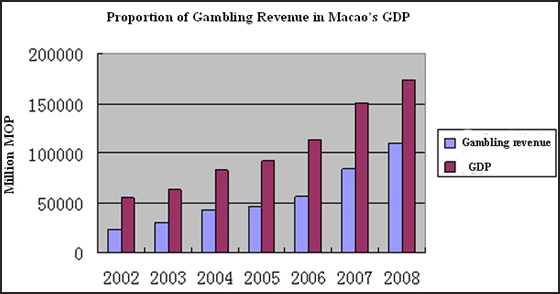Macao: from gambling to a diversified economy
Macao, the most vibrant gambling market in the world, is striving to develop a moderately diversified economy, but, experts and officials say, it will have a tough road ahead.
The small city, located on the southeastern coast of China, covers an area of just 29.2 square kilometers and has a population of 541,200. Gambling was legalized in Macao more than 150 years ago and by the end of 2006, it had surpassed Las Vegas as the world's largest gambling market.
Gambling is one of the oldest industries in Macao and has now become the city's dominating industry. Last year, gambling revenue reached 109.83 billion MOP (13.6 billion US dollars), accounting for 63.9 percent of the local GDP.

Negative impact of a dominating gambling industry
However, Macao's overdependence on the gambling industry has caused some social and economic problems.
As the global financial crisis and the A/H1N1 flu spread, the number of visitors to Macao fell by 10 percent year on year in the first five months of this year. After a negative growth in the last quarter of 2008, Macao witnessed another decline of 12.9 percent in its GDP growth in the first quarter of this year.
As the gambling industry has experienced explosive growth, other areas of the economy and society have failed to keep up.
One of the major negative impacts of the expanding gambling industry is its effect on young people in Macao, according to Yin Yifen, a professor on social economy and public policies in Macao Polytechnic Institute.
"Many young people here in Macao don't go to high schools or universities for further studies because they can easily find a well-paid job in casinos," he said.
Lee Chong Cheng, a member of the Macao Legislative Assembly, attributed this to a lack of choices for young people.
"It is a result of an absence of a diversified economy in Macao. There aren't many job vacancies in other industries," he said. "We need to focus on developing a diversified economy to give our graduates multiple choices."
Tough road ahead
However, the road to develop a diversified economy will be a long and difficult one.
Legislator Lee said that Macao investors lack the motivation to invest in other industries.
"When one can make huge profits from a few VIP guests of casinos, why should he invest in other sectors," said Lee. "Currently, VIP business contributes to a bulk share of the gross revenue of the gaming industry. If this structure is not changed, it is difficult for Macao to develop a moderately diversified economy."
Lee had another concern that if the proportion of non-VIP businesses increases, more visitors will come to Macao and the small city might not have adequate transport capacities.
Professor Yin echoed saying that Macao is too small to develop a diversified economy.
Efforts to achieve a diversified economy
However, he said, there are currently two approaches to this end: a vertical approach that suggests first developing industries that are closely related to the gambling industry like culture, retail, catering, convention and exhibition; and a horizontal approach that suggests developing industries that are not related to the gaming industry like the manufacturing industry.
Yin, like most experts, prefers the vertical approach, believing it is more practical and feasible.
In the past few years, the Macao government has adopted measures to develop other industries.
Revenue from the convention and exhibition industry, which the local government is actively promoting, is expected to reach 800 million MOP (100.19 US dollars) from less than 100 million MOP (12.39 million US dollars) in 2004.
The newly-elected third-term Chief Executive (CE) of Macao Special Administrative Region (SAR) government Chui Sai On has also pledged efforts to develop a moderately diversified economy.
The government will set aside special funds to build talent pools to develop the convention and the cultural industries.
Yin also suggested Macao government actively take part in regional cooperation in the Pearl River Delta, especially in the development of the Hengqin Island, to help achieve a diversified economy.
Hengqin Island is situated in neighboring Zhuhai City. According to the island's development plan, which was approved by the central authorities of China on August 14, the development of the island will help maintain the long-term prosperity of both Hong Kong and Macao and promote economic diversification in Macao.
The Macao government has yet to make a detailed plan for participating in the development of Hengqin so that industries in the two areas can complement and support each other, said Yin.
"The government should also play an organizing role so that Macao businesses can better participate in the region development," he said.
Some other experts also suggested the establishment of a government investment fund, which will receive its capital from Macao's 100 billion MOP (12.39 billion US dollars) in fiscal surplus, so as to provide further capital support for Macao's integration into the regional cooperation.
 0 Comments
0 Comments







Go to ForumComments